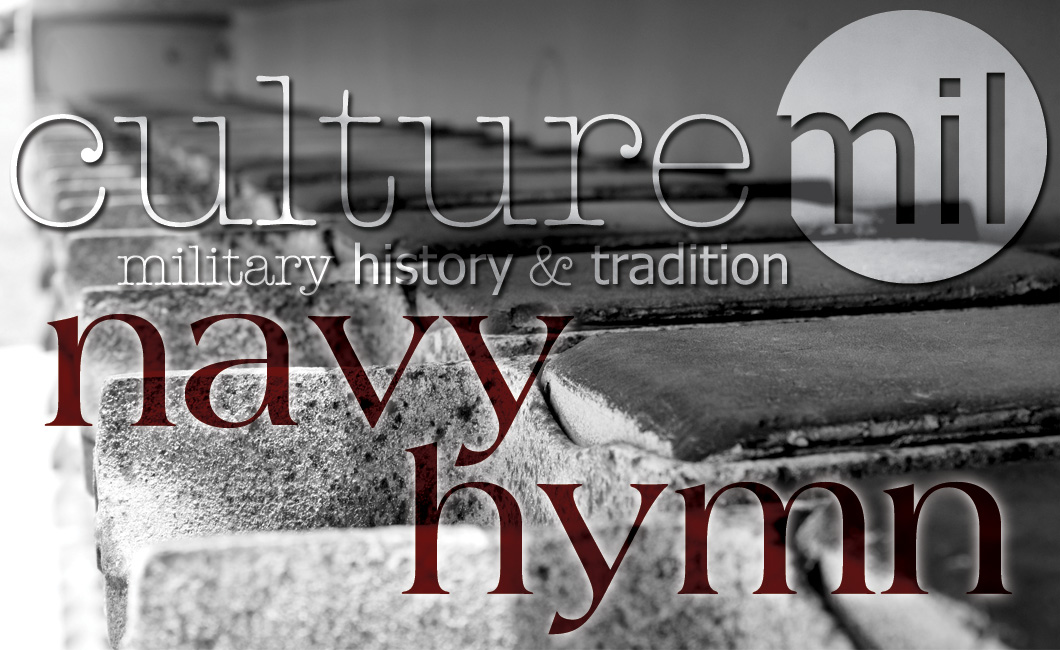- history.navy.mil/browse-by-topic/heritage/customs-and-traditions/the-navy-hymn.html
- navy.mil/navydata/nav_legacy.asp?id=172
- en.wikipedia.org/wiki/Eternal_Father,_Strong_to_Save
Written by Jenifer Chrisman on December 17, 2015.
Eternal Father, Strong to save,
Whose arm hath bound the restless wave,
Who bid’st the mighty Ocean deep
Its own appointed limits keep;
O hear us when we cry to thee,
for those in peril on the sea.O Christ! Whose voice the waters heard
And hushed their raging at Thy word,
Who walked’st on the foaming deep,
and calm amidst its rage didst sleep;
Oh hear us when we cry to Thee
For those in peril on the sea!Most Holy spirit! Who didst brood
Upon the chaos dark and rude,
And bid its angry tumult cease,
And give, for wild confusion, peace;
Oh, hear us when we cry to Thee
For those in peril on the sea!O Trinity of love and power!
Our brethren shield in danger’s hour;
From rock and tempest, fire and foe,
Protect them wheresoe’er they go;
Thus evermore shall rise to Thee,
Glad hymns of praise from land and sea.
Written as a hymn in 1860 by Reverend William Whiting of Winchester, England, the Navy Hymn (original verses above) is a musical benediction favored by the U.S. Navy, the Royal Navy (UK) and more recently, it has become part of the French naval tradition. The following year (1861), the words were adapted to music composed by Reverend John Bacchus Dykes, an Episcopalian clergyman in England.
Whiting, an Anglican clergyman and schoolmaster of the Church of England, was inspired by an experience in the Mediterranean. Having survived a furious storm and residing on the English coast, Whiting penned the hymn when a student was preparing to set sail to the United States.
In 1879, then Lieutenant Commander Charles Jackson Train, inaugurated the present practice of concluding each Sunday’s Divine Services with the singing of the first verse at the United States Naval Academy at Annapolis. Train, who retired a Rear Admiral, was an 1865 graduate of the Academy and was in charge of the Midshipman Choir at the time.
Entitled “Eternal Father, Strong to Save,” outside the Navy, the hymn can be found in most Protestant hymnals. There are now a number of alternate verses by varying authors since it was originally published in 1860-61, which can be found at navy.mil/navydata/nav_legacy.asp?id=172 or history.navy.mil/browse-by-topic/heritage/customs-and-traditions/the-navy-hymn.html. Variant verses for other military services can be found at en.wikipedia.org/wiki/Eternal_Father,_Strong_to_Save.
The hymn was played at Franklin Delano Roosevelt’s funeral in Hyde Park, New York, in April of 1945. Roosevelt, who served as President of the United State from 1933-1945, had served as Assistant Secretary of the Navy under Woodrow Wilson’s presidency from 1913-1920. It also was played as John Fitzgerald Kennedy’s body was carried up the steps of the U.S. Capitol by the Navy Band in 1963. Kennedy, who served as President from 1961-63, also served as a Lieutenant, junior grade, PT (Patrol Torpedo) boat commander with PT-109 during World War II.
Sources:



